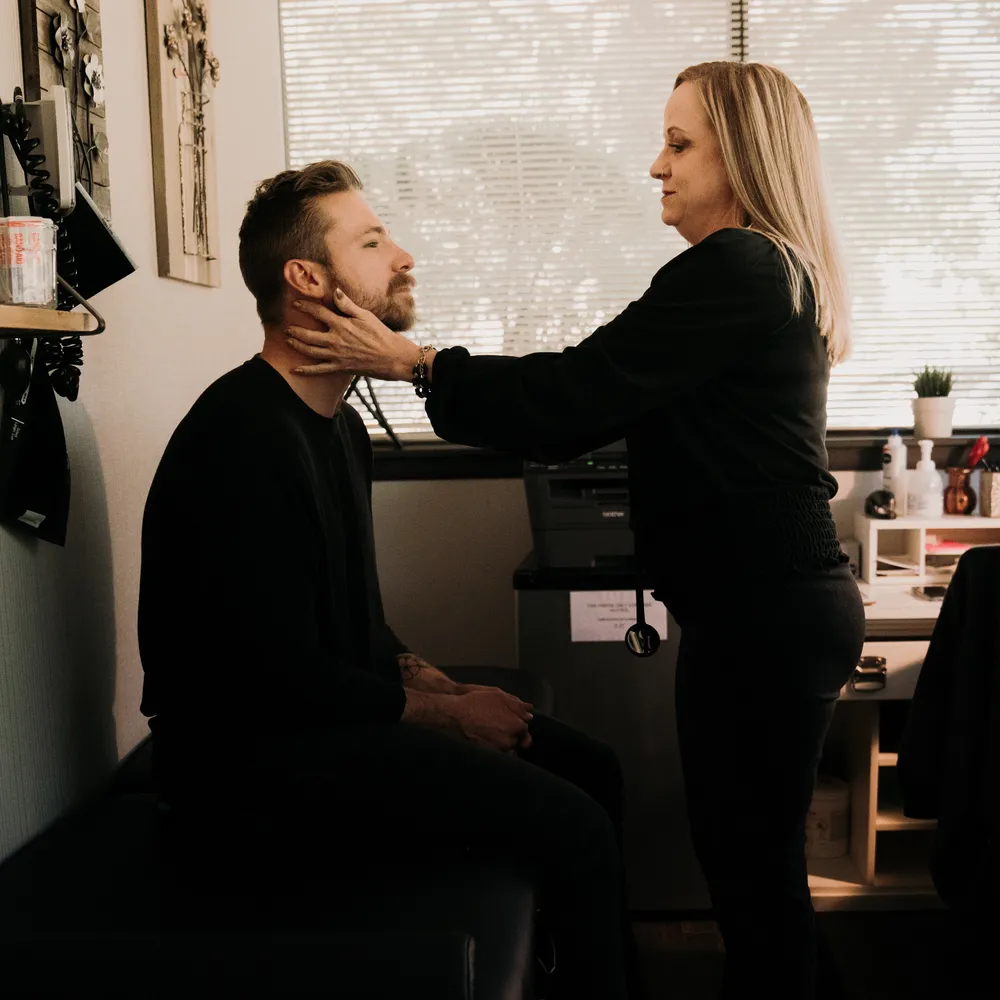
Our Pathways to Recovery
Explore a range of specialized programs designed to foster sustainable recovery through personalized, evidence-based approaches.

Explore a range of specialized programs designed to foster sustainable recovery through personalized, evidence-based approaches.

At The Redpoint Center outpatient programs we know, from decades of experience, that recovery is a process, not an event. Because of this, we structure our...
Read More
The Redpoint Center offers a continuum of care for clients recovering from substance use disorder (SUD) and co-occurring mental health issues. Our center...
Read More
The teenage years are crucial to one’s overall development. This is when your child’s mind is constantly evolving. The teenage years should be filled with fun, new challenges, and learning...
Read More
At The Redpoint Center outpatient programs we know, from decades of experience, that recovery is a process, not an event. Because of this, we structure our programs around the client based on individual needs and clinical necessity. In addition, it is about each client’s readiness to move forward in life.
When seeking treatment, often we are intimidated by the distance or lack of proximity to our families and our work lives. In addition, we may be concerned about sustainable recovery when we seek treatment far from our day-to-day experience. Outpatient allows us to maintain our daily responsibilities while also seeking the much-needed safety and support found in a therapeutic environment. This is key. We meet our clients exactly where they are. We are not here to put lives on hold. And we know that many of us have been through a lot already. Our goal is to simply provide support in a flexible manner that ensures clients do not have to travel far, stop working, or disconnect from their daily lives.
Whether you or your loved one is coming to us as part of an aftercare plan from a residential facility, or you are looking for a healthy addition to your already busy schedule, the team at The Redpoint Center is confident that we can develop a treatment plan to support you. Furthermore, our compassionate care will hold you every step of the way. We offer several programs for addiction treatment in Colorado.
Most organizations have a medical or psychiatric professional come in once or twice per week to treat participants that specifically present a need for medical or psychiatric care. We provide a more comprehensive approach. Our Medical Director, Dr. Ashbaugh is on-site 5 days per week and meets with each participant upon intake. In addition, her clinical team is available and personable. This is a vital relationship in the recovery process. Learn more about our Medical Model.
Dialectical Behavior Therapy (DBT), Cognitive Behavioral Therapy (CBT), and Eye Movement Sesensitization and Reprocessing (EMDR) are behavioral treatment methods used through individual psychotherapy and group skills training sessions to help our clients learn and use new skills and strategies to cultivate a life worth living. Our therapeutic goal is to develop skills like mindfulness, emotion regulation, distress tolerance, and interpersonal effectiveness for each of our clients, and subsequently empower them to create a new reality for themselves.
Overwhelming or discouraging life circumstances often accompany those that are seeking treatment for a substance abuse issue and are usually the driving force behind the decision in the first place. Given this, The Redpoint Center places a strong emphasis on a comprehensive approach to the management of each individual we treat. Whether we use the word coaching, case management, or mentoring, the idea is the same. Whether it be strained personal relationships, problems with employers or educational institutions, consequences with the law, or financial difficulties, our team of professionals is available to help reconcile these issues. Our case management team’s primary role is to help our clients identify problematic areas in their lives and to provide the support and resources necessary to course-correct these areas.
In conjunction with the therapeutic exercises that take place in a group setting, The Redpoint Center ensures each client has the opportunity to work with a therapist, one-on-one. These sessions create an opportunity to build trust and dive deeper into issues that may arise in a group setting and in day-to-day life. We create an atmosphere of absolute safety and trust as we unveil the root causes and conditions associated with disordered and harmful behaviors.
Destructive behavior patterns and a negative view of one’s self do not happen by accident or as a result of a moral failing. These patterns and belief systems are learned through life circumstances and can often be traced back to a specific moment or period in someone’s life. Evidence suggests that until someone can have a clear understanding of where these behaviors and beliefs stem, it is difficult to change them. Our approach to this issue is structured in a phasing-up process in which our clients can safely engage in the work.
Facing the challenges of early recovery can be overwhelming. In addition, struggles can leave one feeling paralyzed. This is why our therapeutic support includes motivational interviewing. Motivational interviewing is a psychotherapeutic approach that attempts to move an individual away from indecision or uncertainty and towards finding the motivation to making positive decisions and accomplishing established goals.
Because of the way drugs and alcohol affect the brain, substance use disorder can often handicap educational and professional aspirations. When an individual in early recovery is attempting to start over, they may be doing that in the face of some difficult consequences. In response to this reality, The Redpoint Center’s case management team is committed to helping its clients navigate their way back to the path of progress.
At The Redpoint Center we believe that simply abstaining from mind altering substances is not a sufficient or worth-while goal. Our objective to motivate our clients to find a community that supports and champions a life of vitality and connection. Though by no means a requirement of the program, our team recognizes and endorses the strength of a 12-step community, and the inherent value of its program.
The clinical team at The Redpoint Center believes that if a client is going to apply new recovery skills into his/her life, they must have an opportunity to practice them. This is why our clients participate in experiential groups. These groups take an individual out of education and into application. Common examples found in our treatment setting include, equine therapy, adventure based therapy and role-play exercises in psychodrama therapy.
At The Redpoint Center, we believe that relapse, like recovery, is not a singular event as much as it is a process. Taking on a new way of thinking and posturing one-self towards life is no small task, and certainly doesn’t happen overnight. Therefore, it is no surprise when an individual reverts back to a way of thinking that feels familiar; however harmful it may be. In response to this, our team will instill mindfulness based skills to our clients as a means of safeguarding them from these mental slip ups. Mindfulness serves as a powerful anchor to the present moment and to the reality that an individual is safe and that using substances will not fix but only accentuate a distressful, presenting issue. These skills take time to develop, yet in time they can become a powerful and working part of the mind.
At The Redpoint Center, family therapy is integral. During the early therapy sessions, participants work with their therapist to create a comprehensive plan for how to incorporate the family into the treatment process and provide targeted services to help family systems find recovery. Families or participants designated “chosen family” have access to treatment team members who will communicate with each family ongoing. Following the participants progress through the program, a licensed marriage and family therapist (LMFT) may be retained so that each participant and their loved ones may participate in a family reunification process.
The experience of grief, loss and shame are common among people seeking to recover from a substance abuse issue. These emotions possess the power to keep someone stuck, and perpetuate the cycle of abuse. This is why the team at The Redpoint Center tackles these emotions head-on to begin the process healing. It is important that clients are given the opportunity to mourn in a healthy and safe environment and to start the process of honoring their experience and forgiving themselves. We believe that it is not until someone can accomplish this, that they can truly move on.
For so many, their time at The Redpoint Center has been a cathartic and healing journey. New lives are built, families are reconnected. We know that the relationships to us and the relationships to peers is vital to ensure long term recovery. At The Redpoint Center we offer monthly alumni events that allow our former participants to keep the The Redpoint Center relationships they have formed close.
On the first and third Tuesday of each month The Redpoint Center hosts an open community support group. These groups are open to anyone who knows someone struggling with a substance use, alcohol use, or mental health disorder. Though not therapy, these groups are a chance for families and loved ones to listen to other stories, to tell their own story and to ask for advice.
If you have questions about The Redpoint Center's mental health treatment and drug programs in Boulder, Larimer, or Garfield County, please call (303) 219-0973 or text us now.
Longmont
1831 Lefthand Cir, Suite H
Longmont, CO 80501
Fort Collins
2900 S. College Ave, Suite 3D
Fort Collins, CO 80525
Glenwood Springs
2520 S Grand Ave, Suite 212
Glenwood Springs, CO 81601
Call Now